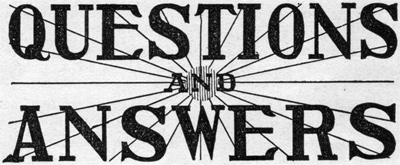 C.—A person who has reached the age of 25 is not too old to begin instruction in singing. You do not say if the person has been singing during the years preceding that age. If the person in question has never sung and knows nothing of music progress will necessarily be slow, but if the voice is there, a good teacher will be able to do something for the singer. Be sure to get the best teacher available; go to him, and have a trial and see what his judgment will be. If the voice is there to build on, the technic and knowledge can be acquired.
C.—A person who has reached the age of 25 is not too old to begin instruction in singing. You do not say if the person has been singing during the years preceding that age. If the person in question has never sung and knows nothing of music progress will necessarily be slow, but if the voice is there, a good teacher will be able to do something for the singer. Be sure to get the best teacher available; go to him, and have a trial and see what his judgment will be. If the voice is there to build on, the technic and knowledge can be acquired.
W. M. D.—There are some differences in the editions of Handel’s oratorio, “The Messiah.” The newest and perhaps the most authoritative is that recently published in London, edited by Prof. E. Prout. We are not prepared to state why these differences exist. It is likely a difference in authority as to certain traditions. One editor may prefer one reading, another editor a different one. The accompaniments differ in Vincent Novello’s, Best’s, and Robert Franz’s arrangements.
J. O.—1. The term “alto” as applied to the female voice is not correct; “alto” is one of the parts in music. It is generally agreed that the voice should be called “contralto.” However, we are correct in speaking of a male “alto,” which is a high voice, and therefore agrees with the root meaning of the word “alto.”
2. Some publishers use the C clef on the third space to indicate the staff from which the tenor is to sing. This clef always indicates the pitch of Middle C.
C. M. E.—It is not well to get in the habit of using troches or similar combinations to “clear the throat.” They weaken and injure the throat in time, and cause the singer to depend upon them in time. If your throat is husky it is a sign of either acute or chronic trouble, and it is well to consult a good physician. If the huskiness be temporary and you must sing, you can use a tablet that will apply to your trouble. If your throat is very moist, use a tablet that is slightly astringent; if your throat shows a tendency to dryness use one that will slightly promote the flow of the secretions. Menthol tablets and other strong preparations are to be used with caution.
A. P.—The course you have outlined, namely: Grade II of the “Standard Graded Course,” Mason’s “Touch and Technic,” and Mathews’ third and fourth grade pieces, to which you have added the “First Study of Bach” seems very comprehensive for a pupil of this grade and should induce satisfactory results. The “First Study of Bach” may be followed by the “Little Preludes,” and these by the “Inventions.” This course in polyphonic playing may be carried out in conjunction with the various volumes succeeding Grade IV of the course.
C. G.—Most teachers prefer to teach the major scales first, one at a time; then follow with the minor scales in relative order. After the scales and key relationships are learned, however, all technical exercise should be carried out in all keys, in chromatic order, and using the parallel minor. Take, for instance, a five-finger exercise: C, D, E, F, G, F, E, D, etc. This would be carried out thus: C, D, E-flat, F, G, F, E-flat, D, etc.; then: D-flat, E-flat, F, G-flat, A-flat, G-flat, F, E-flat, and so on throughout all keys.



